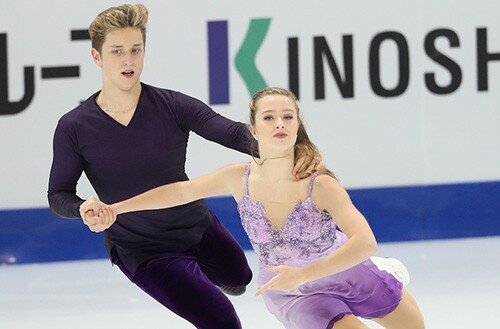
Last February marked the 25th anniversary of a golden night in ice dance at the 1992 Olympic Winter Games in Albertville, France for Marina Klimova and Sergei Ponomarenko. Married since 1984, Klimova, 50, and Ponomarenko, 56, now coach and choreograph a new generation of skaters in Morgan Hill, California.
The duo’s involvement in the sport is not limited to their work, however. Their son, Anthony, 16, is the 2017 U.S. junior ice dance silver medalist with partner Christina Carreira.
While Klimova and Ponomarenko are proud of the progress their son and Carreira have made the past year, it was never their intention to become full-time skating parents.
Initially hesitant, Klimova relented and allowed her then 7-year-old son to take lessons after a friend noted he had potential. “He was a singles skater for the first four years or so, but we realized that he really liked to dance, so we thought maybe he should try to do ice dance,” she recalled.
“We wanted Anthony to be able to skate, but we didn’t want it to be everything,” Ponomarenko added. “We just wanted it to be fun for him — to make a lot of friends and not have the pressure of competition.”
It was inevitable that comparisons would be made once Anthony ventured into the family business. He is flattered when the similarities of his style and that of his parents are pointed out to him. “My mom had a lot of energy when she performed, and judges have complimented my energy in my performances,” he said. “I’ve also been told that my father had the best knee bend in the world, and that they can see him in my knees.”
Despite the comparisons, Klimova and Ponomarenko have made it clear that there is no expectation for Anthony to replicate their achievements. “It is a different sport now — you cannot compare,” Ponomarenko said.
“When I talk with him about skating, there is no pressure,” Klimova added. “I tell him never to compare his skating to ours or anybody else’s. I always encourage him to find his own way, and to represent himself in the best way he can.”
That approach has benefited Anthony and Carreira. “My parents encourage me to be successful, but I don’t feel pressure to replicate what they did,” he said. “I am only a junior skater and not at their level. I want to have a good skating career that is based on my own achievements, and that’s what my parents encourage me to do. I just focus on my own skating. I need to climb the ladder at my own pace, and my journey will be different from theirs.”
Initially coached by his parents, Anthony moved to Novi, Michigan, — where Carreira was based — to work with Igor Shpilband. “My parents were a big part of my skating, but I felt like I needed a change,” Anthony explained. “Kids don’t really listen to their parents. I needed to make the move and the decision was mutual.”
Though the move was easy for him, it was challenging for his parents, who remained in California. “Anthony brings so much enthusiasm to the home. He is always smiling and full of laughs. I never get bored with him around. Now it’s so quiet,” Klimova said. “The first year was hard and I could not adjust. He’s still at a very difficult age so I made the decision to spend some time in Michigan with him. I drove him to school, cooked for him, and made sure that he was on the right track. It was good for us to spend that time together.”
Anthony goes home three or four times a year and said that he likes to spend a lot of time with his older brother, Timothy, during those visits. “We get along really well. When I am not at home, we text a lot, but when I am home we like to hang out. He comes to Michigan to visit me as well.”
Carreira, 17, who was born in Montréal and speaks French as her first language teamed up with Anthony in 2014. “I was having trials with other guys and I saw him across the rink and knew I just wanted to skate with him,” she recalled.
The duo claimed two silver medals on the Grand Prix circuit in 2016, which automatically assured them a place at the Junior Grand Prix Final in Marseille, where they placed a respectable fourth in their debut. “It was the coolest experience ever,” Carreira said. “It was our first big competition. It was such an amazing feeling to compete with the best in the world. I’m a very competitive person, and I wanted us to skate the best programs we possibly could to get the best result. More importantly, it was an opportunity to learn from the senior level competitors at that event. We look up to all of them and they inspire us in so many different ways.”
Anthony said they went into the competition with a nothing-to-lose approach and that achieving a particular placement was not their goal. “We wanted to show our skating ability. We did two clean programs and that’s all we asked for.”
At the 2017 U.S. Championships in January, the duo was on a mission to earn one of the three spots up for grabs at the World Junior Championships. Third after the short dance, neither was expecting to leapfrog over the then reigning World junior champions (Lorraine McNamara and Quinn Carpenter) and land in second place. “It was a very nice surprise. We were really happy about it,” said Carreira.
More surprises lay in store at World Juniors in March. The duo made a splash in their debut in Taiwan, skating into third place and taking home the bronze medal.
Anthony and Carreira will remain in the junior ranks next season at both the national and international levels. Though the lure of competing on the senior stage in an Olympic year is tempting, they are focused on developing at their own pace. “We are planning to stay junior at least one more season, maybe two. We want to make sure that when we do move up, that we have improved everything so that we do not look like a junior team,” he explained.
“It’s important to us that we look like a senior team and to do that we have to continue to work on our maturity and strength. We need to work on bigger elements — overall speed and maturity and will keep working to keep going in an upward direction.”
The 2018 U.S. Championships are scheduled to take place in Anthony’s hometown of San Jose, California. “I think that competing there will motivate us,” Carreira said. “To prepare for the pressure, we will just train extra hard to ensure that we are fully prepared to stand up to that pressure.”





